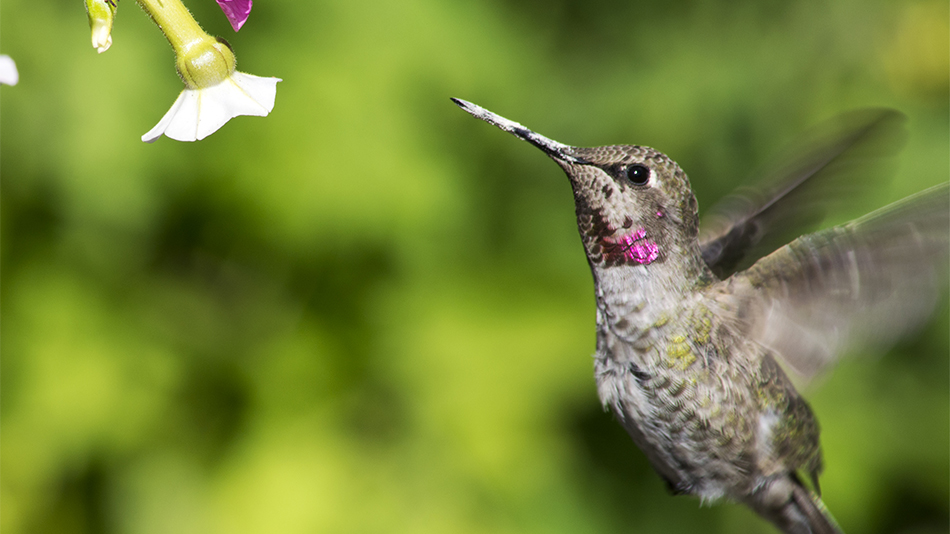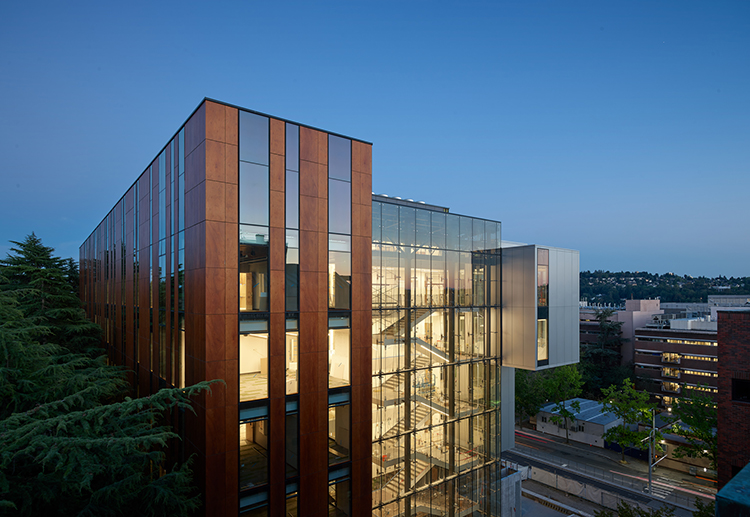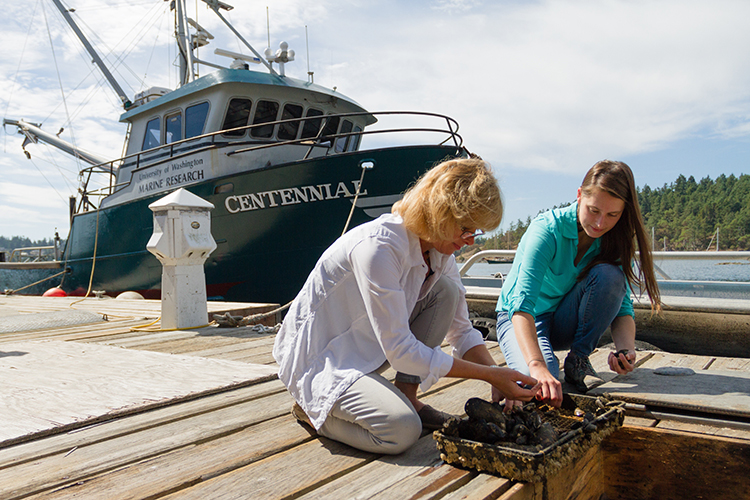
The Department of Biology is the hub of the basic biological sciences at the University of Washington. Through research and teaching programs, we investigate the origins, organization, and functions of living systems, from the molecular through the ecosystem level. Our discoveries contribute to a fundamental understanding of the natural world and have applications in fields ranging from the biomedical sciences to wildlife conservation.
The Departments of Botany and Zoology merged in 2003 to form the Department of Biology. This union recognized that biology research and education is best carried out as an integrated field, enabling us to study and decode nature’s solutions to highly complex problems as a team.
VISIT DEPARTMENT WEBSITE1,176
Undergraduate majors
EDUCATION
With over 1,100 undergraduate majors, the Department of Biology is among the largest undergraduate degree programs at the University of Washington and a vital STEM pipeline for the state of Washington. Forty percent of our undergraduate majors are engaged in faculty-mentored research projects and contribute exciting discoveries to their research field. They present their results at university, regional, national and international scientific meetings, and co-author papers in prestigious journals. Through coursework and activities such as research and internships, our undergraduates gain the requisite knowledge and skills for careers in basic and applied research, education, health sciences, environmental sciences, science policy, government, business and the nonprofit sector.
The Department of Biology’s Ph.D. program includes over 60 graduate students with diverse backgrounds and research interests. Their integrative approaches include, and often combine, theory and experiments in the laboratory and field. The hallmarks of our Ph.D. program include a strong commitment to interdisciplinary training that capitalizes on our broad department and strong relationships with Friday Harbor Marine Labs, the Burke Museum, and the Fred Hutchinson Cancer Research Center, among others. With their faculty mentors, graduate students design individualized programs of advanced coursework and research in a wide array of areas, from paleobiology to cell biology to ecology. Graduate study provides students with the background necessary to assume leading positions as independent researchers and teachers in academic settings, government, or private industry.

Students
Autumn 2025
- 1,176 Undergraduate majors
- 67 Graduate students
- $460K+ Departmental undergraduate scholarships, graduate fellowships, research awards, and prizes awarded in the 2024-2025 academic year.
Degrees Awarded
Autumn 2024-Summer 2025
- 563 Bachelor's degrees
- 16 PhD degrees (since Summer 2023)
- 3 MSc degrees (since Summer 2023)
Undergraduate Awards
Since 2023
- 69 Mary Gates Research Scholarships
- 7 Mary Gates Leadership Scholarships
- 6 Levinson Scholars
- 1 UW Dean’s Medalist in the Natural Sciences
- 1 Goldwater Scholar
- 15 Husky 100 Honorees
- 1 UW Homecoming Scholar
Graduate Awards
Autumn 2025
- 1 NW CASC Fellowship
- 1 NIH F31 NRSA
- 6 NSF GRFP
- 1 Auditory Neuroscience Training Grant
- 1 CMB Training Grant
- 1 Boeing Fellowship
- 2 UW Graduate School Top Scholars
- 1 DOE CSGF
- 2 Simons Foundation Fellowships in Ecology & Evolution
- 7 ARCS Scholars
- 1 UW Graduate Medal Award
FACULTY

Autumn 2025
- 53 Academic Faculty
- 2 Research Faculty
- 12 Teaching Faculty
- 19 Post-Doctoral Researchers
- 38 Emeritus Faculty
- 18 Affiliate/Adjunct Faculty
Faculty Awards & Honors
- 3 MacArthur Fellows
- 6 National Academy of Science Members
- 6 American Academy of Arts & Sciences Members
- 16 American Association for the Advancement of Science Fellows
- 12 Guggenheim Fellows
- 10 Washington State Academy of Science Members
- 6 Fulbright Scholars
- 1 HHMI Scholar
- 1 HHMI Investigator
- 2 Sloan Fellows
- 1 Heinz Award
- 2 NSF Presidential Early Career Awards for Scientists and Engineers (PECASE)
- 7 NSF CAREER Awards
- 12 Distinguished Teaching Awards
- 2 Distinguished Graduate Mentor Awards
- 7 Undergraduate Research Mentor Awards
- 9 Endowed Chairs/Professors
- 1 Allen Distinguished Investigator
- 1 Packard Fellowship for Science and Engineering
RESEARCH
The Department encourages research and teaching collaborations that link faculty, postdoctoral researchers, graduate students, undergraduates and even high school students with colleagues in other units on the UW campus and beyond. These collaborations reflect the role of biology as a keystone science relevant to other disciplines such as chemical, physical, and mathematical sciences; engineering; and policy. One third of our faculty are appointed to units such as Psychology, Computer Science, the Burke Museum, the School of Medicine and the College of the Environment in addition to Biology. Examples of research topics in the Department of Biology include:
- examining neuronal processing of scent, and how it drives animal behavior;
- developing active learning strategies that improve student performance in college science courses;
- investigating the ability of vegetation to modify climate;
- exploring how organisms alter their environment, which in turn influences their evolution;
- understanding the signaling network plants use to change their form in response to light;
- quantifying human and environmental impacts on threatened species, and collaborating to develop conservation policies.
Research Areas
- Developmental Biology
- Ecology and Conservation Biology
- Evolution and Systematics
- Genetics and Comparative Genomics
- Marine Biology
- Mathematical and Computational Biology
- Molecular and Cellular Biology
- Neurobiology and Behavior
- Paleobiology
- Physiology
OUTREACH
The Department of Biology has formed intellectual partnerships across campus and with colleagues at other institutions, from collaborations within the natural and social sciences to those in engineering, medicine, law, and business. The Department also works in partnership with medical facilities, biotech companies, environmental conservation organizations, and local, state, and federal government agencies. Biology undergraduates have interned at the Woodland Park Zoo, Seattle Aquarium, Fred Hutchinson Cancer Research Center, and several private biomedical institutions.
OUR MISSION FOR UW BIOLOGY
The Department of Biology is committed to excellence in teaching and research across diverse systems and scales of the living world, with a strong focus on collaborative and interdisciplinary work, developing evidence-based teaching and learning practices, and providing service to our broader community.
SUPPORT BIOLOGY
Gifts to the Department of Biology play a very significant role in fulfilling our goals to educate the next generation of global citizens, to sustain world-class research programs and to attract and retain the best faculty and students. If you are interested in making a tax-deductible gift to UW Biology, please visit our Support UW Biology page for more information or contact us at uwbio@uw.edu.
CONTACT
Department of Biology
Box 351800
University of Washington
Seattle, WA 98195
(206) 543-1620
biology.washington.edu
last update: December 2025